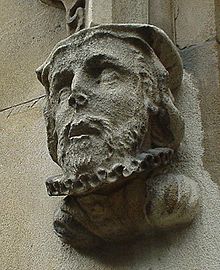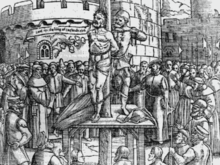William Tyndale
William Tyndale , also William Tindale [ ˈtɪndəl ] (* around 1484 in North Nibley near Gloucester , England ; † October 6, 1536 in Vilvoorde near Brussels ) was an English priest and scholar and translated the Bible into English . His translation of the Bible , which existed about 100 years before the Engl. King James' Bible was not the first English translation of the Bible, but thanks to the invention of the printing press it was the first to be widely distributed.
Life
The date of his birth is uncertain; it is between 1484 and 1496. He was probably born in North Nibley, 15 miles from Gloucester, England. He received his university education at Oxford , Magdalen Hall and at Cambridge University . Around 1520 he became tutor to the family of Sir John Walsh in Little Sodbury in Gloucestershire .
Tyndale studied the Bible and took up the teachings of the Reformation ; these views were heretical from the Roman Catholic point of view . This led to conflict. Tyndale left London around 1523. With the support of Sir Humphrey Monmouth, a wholesale merchant in London, and other citizens interested in a translation of the Bible, he began to translate the Bible into English in Germany, probably in Wittenberg (see below). This translation was not authorized by the Church , it contained comments reflecting reformist perspectives. As a result, he could no longer work in England. Persecuted for heresy, Tyndale remained in Germany.
In the spring of 1524 Tyndale came to Wittenberg University via Hamburg , where he was enrolled on May 27, 1524 under the pseudonym "Guillelmus Daltici ex Anglia". Here he worked on his Bible translation until he had a ready-to-print template in 1525. He took these to the Quentel printer in Cologne, where 3,000 copies were originally to be printed in quarto format. However, the printing was betrayed in 1526 by Luther's opponent Johannes Cochläus , but Tyndale was able to escape to Worms with his colleague . The printing of the New Testament had started in Cologne in the summer of 1525, in Worms it was started all over again, and in 1526 an edition in octave format with an edition of 6,000 copies was published by the printer Peter Schöffer the Younger .
Tyndale's translation was banned by the English government and his books were burned. Only two copies of the Worms octave edition have survived. Tyndale himself was sentenced to death at the stake at the instigation of representatives from King Henry VIII and the Church of England , which was just beginning to break away from the Church of Rome and which still adhered to its view on the matter . He was strangled on October 6, 1536 in Vilvoorde (approx. 10 km north of Brussels) and then burned.
legacy
With his translation of the Bible he introduced new terms into the English language : Jehovah , Passover (as a name for Passover ), scapegoat , atonement (= at + one + ment ), "the powers that be", "my brother's keeper", "The salt of the earth" and "a law unto themselves".
While the King James Bible would later become more influential in English-speaking Protestantism, Tyndale's translation nonetheless constitutes an important building block of the collective Anglophone memory, for two reasons: First, its version was the formulation that William Shakespeare knew and quoted . On the other hand, his translation of the Psalms is the basis for the psalm translations in the various Anglican Books of Common Prayer , which have been used in liturgical applications through the centuries and even today.
Spalatin writes about Tyndale in a diary entry dated August 11, 1526.
Remembrance day

Tyndale's Memorial Day on October 6 applies to the following churches:
- Evangelical Churches:
- Anglican Community
Film adaptations
The life of William Tyndale was filmed twice: on the one hand under the title William Tindale and on the other hand under the title William Tyndale - Outlawed in the name of God . The short film Stephen's Test of Faith also features an acting portrayal of William Tyndale.
See also
literature
- Encyclopaedia Britannica . Volume 22, 1976, pp. 435-436
- JIMombert: Tyndale, William . In: Philip Schaff, Johann Jakob Herzog u. a., Ed .: The New Schaff-Herzog Encyclopedia of Religious Knowledge . Funk & Wagnalls, New York 1904, reprinted online by the Christian Classics Ethereal Library . For further references see there.
- Heinz Holeczek: Humanistic Biblical Philology as a Reform Problem in Erasmus von Rotterdem, Thomas More and William Tyndale . Brill, Leiden 1975
Web links
- Literature by and about William Tyndale in the catalog of the German National Library
- Tyndale society homepage
- William Tyndale's Life and Work
Individual evidence
| personal data | |
|---|---|
| SURNAME | Tyndale, William |
| ALTERNATIVE NAMES | Tindale, William |
| BRIEF DESCRIPTION | English reformer and Bible translator |
| DATE OF BIRTH | around 1484 |
| PLACE OF BIRTH | North Nibley near Gloucester , England |
| DATE OF DEATH | October 6, 1536 |
| Place of death | Vilvoorde near Brussels |


